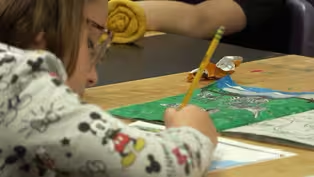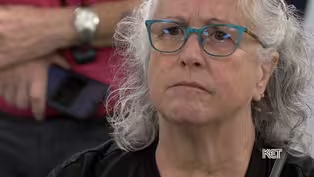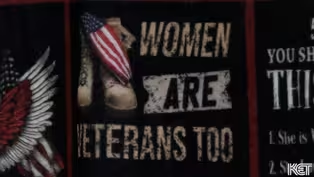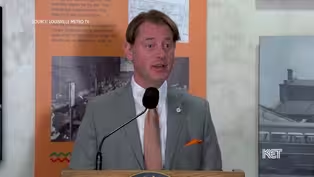
Troublesome Rising
Clip: Season 3 Episode 108 | 3m 24sVideo has Closed Captions
A new collection of writings from those who experienced the devastating 2022 eastern Kentucky flood.
After the eastern Kentucky floods in July of 2022, the University of Kentucky Press asked Melissa Helton, literary arts director of the Hindman Settlement School, to create a book about the flooding and the impact of natural disasters in Appalachia. That anthology includes the perspectives of those who've experienced disasters firsthand and from far away.
Problems playing video? | Closed Captioning Feedback
Problems playing video? | Closed Captioning Feedback
Kentucky Edition is a local public television program presented by KET

Troublesome Rising
Clip: Season 3 Episode 108 | 3m 24sVideo has Closed Captions
After the eastern Kentucky floods in July of 2022, the University of Kentucky Press asked Melissa Helton, literary arts director of the Hindman Settlement School, to create a book about the flooding and the impact of natural disasters in Appalachia. That anthology includes the perspectives of those who've experienced disasters firsthand and from far away.
Problems playing video? | Closed Captioning Feedback
How to Watch Kentucky Edition
Kentucky Edition is available to stream on pbs.org and the free PBS App, available on iPhone, Apple TV, Android TV, Android smartphones, Amazon Fire TV, Amazon Fire Tablet, Roku, Samsung Smart TV, and Vizio.
Providing Support for PBS.org
Learn Moreabout PBS online sponsorshipAfter the eastern Kentucky floods in July of 2022, the University of Kentucky Press asked Melissa Helton, literary arts director of the Heineman Settlement School, to create a book about the flooding and the impact of natural disasters in Appalachia.
That anthology includes the perspectives of those who have experienced disasters firsthand and from far away.
Appalachian history has been told by outsiders.
And so it's very important for the people of Appalachia to be able to document such important things.
And we tried when we were soliciting writers and when I was selecting what pieces to put in here to give a wide view.
So some of these pieces are fiction because you can humanize a tragedy through a character.
Some of them are poems, some of them are essays, but they don't just talk about this flood.
We're looking at pieces like I asked Elizabeth Lynn Glass to write a piece specifically on how natural disasters impact people with disabilities.
We looked specifically for Amelia Kirby wrote a piece on mental health impacts.
And if you get Shuffle wrote about how this can push people in drug recovery to to relapse and overdose, we're honored to have new work from like Lee Smith and Frank Walker, Nikki Giovanni, George Lillian.
And then next to these people who are very well known, we have people who might be their first publication credit, whether it's the first time publishing photos or first time publishing an essay.
So this really shows a wide variety of writers at different parts of their career who are impacted by this.
I really wanted them in this book kind of without hierarchy, because the water didn't care who you are.
Carter Sickles had written an essay maybe a week or two after the flood, and I asked him if we could reprint that.
And he decided to put it in the title on it.
And the one he came up with was Troublesome Rising, because the creek that goes through campus is called Troublesome Creek, but also the a lot of the pieces in here call out extractive industry, call out climate change, things like that.
And so it also talks about this troublesome increase that we're having this arising.
We're having a natural disasters, their frequency and severity.
But also I wanted it to be able to be interpreted kind of this triumphant community, the community in eastern Kentucky, that that went through this rescuing themselves, that it's you know, it's rising up out of out of the mud, as it has before.
And unfortunately, we'll have to do again and again What I hope that anthologies like this and listening to writers and artists who live in a region is that they can show us the nuances of it.
They can show us that it's that it's not a monolith.
You can't point at a geographical place on a map and say the people who live like there are like this.
Because you would think an anthology about Eastern Kentucky wouldn't have queer and trans writers and writers of color and we would think that it's just this monolithic, white, Christian, straight Republican community and realities is far more complex and interesting than that.
Could This Be Kentucky's First Charter School?
Video has Closed Captions
Clip: S3 Ep108 | 3m 37s | Gus LaFontaine hopes to open Kentucky's first charter school. (3m 37s)
Video has Closed Captions
Clip: S3 Ep108 | 2m 50s | Groups for and against amendment two make their case to the voters. (2m 50s)
Filling a Gap for Female Veterans
Video has Closed Captions
Clip: S3 Ep108 | 3m 23s | Anna's House helps women leaving the military find the resources they need. (3m 23s)
Video has Closed Captions
Clip: S3 Ep108 | 1m 27s | Sec. Adams expects more than two million Kentuckians will cast a vote in next month's election. (1m 27s)
Providing Support for PBS.org
Learn Moreabout PBS online sponsorship
- News and Public Affairs

Top journalists deliver compelling original analysis of the hour's headlines.

- News and Public Affairs

FRONTLINE is investigative journalism that questions, explains and changes our world.












Support for PBS provided by:
Kentucky Edition is a local public television program presented by KET



